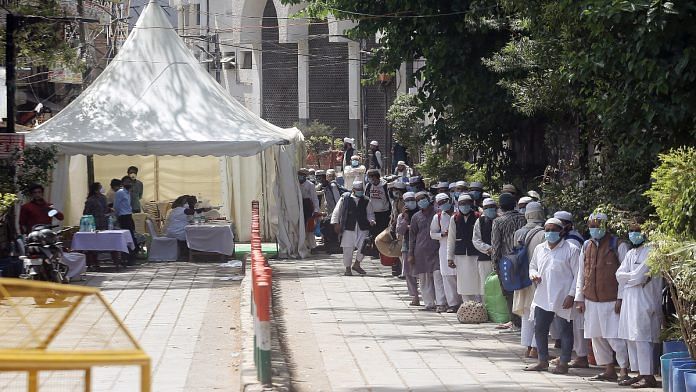New Delhi: The Patna High Court has quashed criminal prosecution against 18 foreign nationals, who visited Tablighi Jamaat markaz (headquarters) in Delhi’s Nizamuddin prior to the congregation there, after the Bihar Police could not produce evidence to show they violated visa conditions by indulging in preaching activities.
A bench led by Rajeev Ranjan Prasad held that 18 foreigners did not attend the congregation held before the lockdown and even if they would have attended, it wouldn’t have amounted to canvassing or preaching religious ideologies. Therefore, the court ruled that the 18 foreigners had not violated any visa conditions on which they were allowed to enter India.
The same bench, however, allowed prosecution against three Indians for not informing the local police regarding the stay of the foreigners in the mosque managed by them.
It also went on to give wider interpretation to the term “hotel” under The Foreigners Act, 1946, to hold that if the management of a mosque is providing accommodation to Tablighi members from foreign countries, then it is obliged under the law to register details of foreigners who are living there. The regulation makes it mandatory to register the details even if the member stays free-of-cost or in lieu of a reward or a consideration.
Also read: Let’s talk about how Tablighi Jamaat turned Covid hate against Muslims around
Two writ petitions, two questions of law before court
The high court was seized of a set of two petitions filed by 21 people from Araria district. While 18 were foreigners belonging to Bangladesh, Malaysia and Australia, three were local residents of Araria, who were associated with the management of the mosque, where the foreign nationals stayed.
Nine from Bangladesh entered India through West Bengal to attend the Tablighi event in the capital. They reached Araria on 11 March and were lodged in ‘Rawahi Markaz’ there when they learnt of the MHA order, asking states to screen, quarantine and deport foreign nationals, who attended the Nizamuddin gathering between 12 and 14 March.
As the nationwide Covid-19 lockdown was announced on 24 March, the petitioners were left stranded in Araria. They were screened by the administration and then put into quarantine at Rewahi Markaz for the mandatory period based on the government’s standing operating procedure.
On 9 April, an FIR was registered against them by the local police for allegedly violating visa conditions.
The other nine from Malaysia and Australia were in Araria on 23 March and were stranded in Jama Masjid Markaz there after which an FIR was registered against them on 12 April.
All claimed before the high court that they were compelled to stay in India, despite expiry of their visa. In their petitions, they also raised before the court that they did not indulge in any preaching activity, but had visited India as tourists.
The three Indians sought quashing of the case against them on the ground that a mosque or markaz cannot be defined as a “hotel” under the law, so as to make it compulsory for them to furnish information about foreigners staying there to the police.
Opposing the petitions, the Centre read out Government of India’s consistent policy that a foreign national visiting India on tourist visa cannot indulge in preaching religious ideologies unless permitted.
On the definition of the word ‘hotel’, the government said the court must give it an extensive meaning so as to say that in case the management of ‘markaz’ or ‘masjid’ is providing lodging facility to a foreign national or a team of foreign national on regular basis, the facilities so provided to a traveller would be covered within the meaning of the word ‘a boarding house’ or ‘a rest house’.
‘Central govt guidelines permit attending Tablighi congregation’
The Centre’s circular of November 1996 was considered before the court gave its ruling in the case. The circular disallowed foreign nationals entering India on tourist visas to indulge in religious or Tablighi work.
At the same time, the circular clarified that attending “Tablighi Jamaat ijtema” (congregation) does not amount to Tablighi work prohibited under instructions.
Another circular of April 2015, issued by the Ministry of Home Affairs, took notice of the fact that there is a significant increase in the number of foreign Tablighi Jamaat members visiting India, mostly from Indonesia, Malaysia, Myanmar, Sri Lanka, Saudi Arabia, Algeria, France, UAE, Qatar, Bangladesh and Egypt on tourist visa and that such teams usually stay at various mosques/madrasas and engage themselves in religious preaching, which is clear violation of visa rules.
The court did not doubt the purpose behind such guidelines, which, it said, was to make sure foreign nationals on tourist visas do not indulge in Tablighi work.
However, the “guidelines gave them permission to attend Tablighi Jamaat and such act of mere attending does not amount to Tablighi work prohibited under the instructions”.
In the case at hand, the court held that in the course of investigation, except the members of the police, who were present in course of raid in the markaz and the mosque in Araria, respectively, no other independent witnesses were examined.
“No material in the form of audio/video cassettes, leaflets or pamphlets have been found in possession of these foreign nationals. There is absolutely no material in the case diary to even prima-facie suggest that these foreign nationals had indulged in preaching of their religious ideologies or that they had addressed any congregation on the markaz and the mosque platform,” it said.
Also read: How Made-in-India Tablighi Jamaat became the largest organisation in Pakistan



